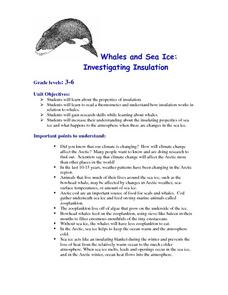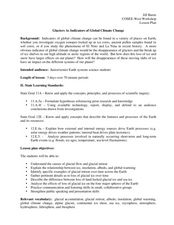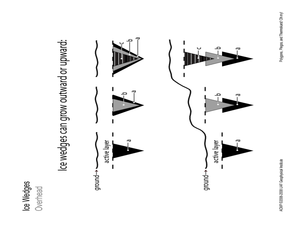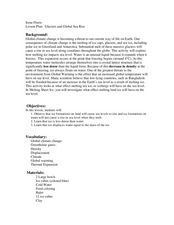Curated OER
Whales and Sea Ice: Investigating Insulation
Students investigate the properties of insulation as it relates to whales and sea ice. They research whales and examine the atmospheric changes that occur when there are changes in sea ice.
Curated OER
Why Do Ice Cubes Melt?
First graders investigate water properties by participating in a hands on experiment. In this ice formation lesson, 1st graders examine real ice cubes in a bowl and identify the reasons why certain cubes melt faster than others. Students...
Captain Planet Foundation
Solar Cooking Race
Study heat transfer with activities that focus on how heat energy works. Using a solar cooker, ice cubes, and heat transfer bracelets, kids experiment and record what they find by keeping ice cubes cold and vegetables hot.
Curated OER
Glaciers As Indicators of Global Climate Change
Students research about glacial ice melting on the four major spheres of the Earth. In this earth science instructional activity, students explain how this process relates to global warming. They create a presentation and share their...
Curated OER
What's The Scoop?
Students explore the properties of matter. In this cross curriculum three states of matter science lesson, students listen to the poem "Eighteen Flavors" by Shel Silverstein, and predict what will happen if listed ingredients are...
Curated OER
Freezing Point Depression
Students create ice cream in a zipped bag and measure the temperature of a salt/ice mixture. They discover how salt lowers the temperature necessary to freeze ice to a solid (below 0'C).
Curated OER
Polygons, Pingos, and Themokarst! Oh MY!
Students complete activities to learn about the common land features in Alaska. In this land study lesson, students study an overhead for permafrost features. Students define ice wedge polygons, thermokarst, and pingos. Students also...
Curated OER
Glaciers and Global Sea Rise
Students explain how melting glaciers affect global warming. In this earth science lesson, students investigate the change in ice density as it melts. They discuss the human and environmental impact of rising sea levels.
Curated OER
Weather, Sea Level Rise and Climate Change Course
Young scholars explain the impact of glacial melting to global climate change. In this environmental science lesson plan, students design an experiment to investigate the effect of salinity change to melting glaciers. They share their...
Curated OER
Understanding Oceans
Students investigate how ocean currents affect our world. For this ocean currents lesson, students perform an experiment to show how cold water is near the poles and warm water is near the equator. Students use water, food coloring,...
Curated OER
Solids and Liquids
Students complete activities to study the properties of solids and liquids. In this states of matter lesson, students investigate the melting and freezing of a range of materials in a virtual experiment. Students melt the substances and...
Curated OER
Rain Formation
First graders investigate the different water formations by conducting an experiment. In this water properties lesson, 1st graders examine jars filled with ice, rain water, air and snow in their class. Students predict what...
Curated OER
States of Matter Lesson
Second graders identify the three phases of matter and demonstrate how a property can change states of matter. In this states of matter lesson, 2nd graders make an Ooze to discover how a solid changes into a liquid. Students...
Curated OER
Dimming the Sun
Students collect, interpret and analyze weather variable data. They describe atmospheric variables that affect evaporation. Students create graphs and analyze the information collected.















